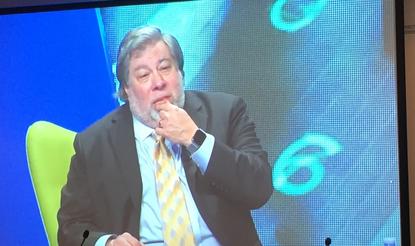Steve Wozniak: AI will eliminate car ownership
- 18 April, 2016 14:58

Steve Wozniak speaking at the Future Transport Summit in Sydney
Apple co-founder and PC revolutionary, Steve “the Woz” Wozniak thinks there may be no need to own a car in future, thanks to developments in self-driving vehicles and Uber.
Discussing artificial intelligence at the Future Transport Summit 2016 in Sydney, Wozniak said the implications of AI on transportation were bound to be huge, with a subsequent decline in ownership of cars, especially in cities where public transportation was more sophisticated.
Wozniak said he anticipated a gradual shift towards private ownership of vehicles as they start to be seen less as a crucial part of our lives and more as means of getting from A to B.
“Uber is a good example of [why drivers aren’t needed] - if you just order it and a car comes, why does there need a driver? Without a driver we get all the benefits of lower cost and more safety,” he said.
“How long would it take before all the cars were not owned, or self-driving if they are owned?
“Self-driving Ubers are the future, and we can use money we had set aside for a car to pay off student loans or buy new computers.”
Wozniak suggested that despite the dwindling necessity to own a car, some people will still hope to have one due to our human desire to own things.
“I still think people will want to own a beautiful car even if you never see it… Look at the music industry, you used to buy your own CDs and vinyl, and I still have problems giving that up. I still want to buy them and keep them with me in a local form and not just have them in the cloud.”
Should cars go the same way as music, Wozniak says to really give in to cars being self-driving, people may be more likely to subscribe to a car, rather than own it.
“We’re already at a stage with some people who say, I’m only going to have a car so I can take it out somewhere special, for old times’ sake.”
Slowed expectations
Despite these projections, Wozniak concedes that he doesn’t believe completely autonomous cars will available as early as he originally thought, as he feels computers are not yet a suitable replacement for human instinct.
“I have to back off that a little bit. I thought by 2020 every manufacturer would have self-driving cars … but the problem is there are still a few things that humans will spot that the car doesn’t.
“The car knows where the lanes are but doesn’t know the cement wall is 1 inch to the left of this lane and might cross over into the lane. There’s so many issues that humans will deal with on the fly that mean it’s going to take an awful long time cars will be truly self-driving, except maybe on very well-known routes.”
By the same token, Wozniak said the use of sensors, radar and cameras on current self-driving cars will still do great things to reduce accidents based on human error.
“My wife was in a car collision around six months ago; because this other driver had broken up with her boyfriend and she was crying so much she didn’t see the red light. A self-driving car is always going to see the red light.”
On the whole, driverless cars will affect how cars are made and used, whether we need our own cars, how cars can be shared, and also dictate the direction of automobile insurance, Wozniak said.
“All the planning we need to do around that will be very deep, but it’s going to come gradually so it’s good to start thinking about it and taking some necessary steps.”
Follow Bonnie on Twitter: @Bonneth
Follow CIO Australia on Twitter & Like us on Facebook… Twitter: @CIO_Australia, Facebook: CIO Australia

